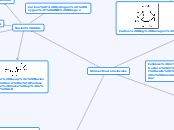por Lidia Shimer hace 7 años
382
Shimer-Macromolecules

por Lidia Shimer hace 7 años
382

Ver más
Solid at Room Temperature
Long, Straight Chains
No C=C double bonds
All C's bonded to H's
(Actual Chain is Bent)
Vegetable Oils
Liquid at Room Temperature
Plant and Fish Fats
Bend in chain
C=C double bonds
Phospholipids are found in the cell membrane